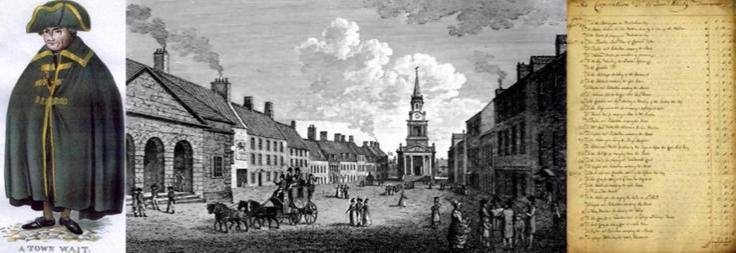The “Waite and Sea” project (2015-2016) relates to the musical heritage of the Berwick area. It has two strands: firstly a musical interpretation of Berwick-upon-Tweed inspired by the estuary, the town and the stories of people’s lives, while the second and equally important strand explored Berwick’s music heritage.
Supported by the Heritage Lottery Fund, the music heritage project explored, through research and interviews, the oral and music traditions from sheep-farming and fishing, the music of the King’s Own Scottish Borderers regiment, and the music of the Town Waits of Berwick. The following account of the project has been provided by Colin Fleetwood.
Berwick’s Town Waits in the Eighteenth Century
“Waits were musicians employed by the civic authorities in almost every town, large or small, in North East England during the Eighteenth Century, to add a little life and excitement to civic processions and other ceremonial occasions, as well as to rouse the town and call the hours.” So writes Roz Southey in her book Music-Making in North-East England during the Eighteenth Century. Southey also points out that very little information survives about the musicians who fulfilled this role, and this is especially true in relation to Berwick’s town waits. This study has aimed to make a modest contribution to our knowledge of these men and their place in Berwick’s history.
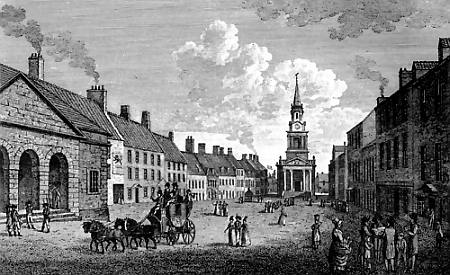
Eighteenth century view of Berwick High Street and Town Hall, with the Main Guard building on the left. From The History of Berwick-upon-Tweed, by John Fuller. Edinburgh, 1799. Engraved by R. Scott.
In his book The History of Berwick upon Tweed, written in 1799, John Fuller MD provided a comprehensive description of the town at the end of the eighteenth century. In the chapter on the customs of the town he makes reference to the waits:
“There are four men called town waits, who belong to the borough. Their business is to walk before the Mayor, Recorder, and Justices, playing on violins all the way to and from the church on Christmas day, the day of the election of a Mayor, and on the 5th of November. They are also obliged to attend these gentlemen at their four public dinners. They have a very large blue cloak, faced with gold lace, and a big cocked hat, also laced with gold, which they wear on these occasions. These waits have a custom of serenading the town. This nocturnal excursion commences in November, and is continued till Candlemas.” (Page 446)
Within a decade of Fuller writing these words, the Guild had taken the decision to discontinue the post of town wait in Berwick. When Robert Miller, Town Waite, died of asthma, on 23rd February 1808, he was not replaced. Two years later the three remaining waits were superannuated. One of these, James Wallace, was paid his salary of £7-00-00 for a further thirty five years. James’ death was reported in the Berwick Advertiser on Saturday March 22nd 1845:
“In the town on the 15th James Wallace, musician, in his 85th year”.
The same edition of the newspaper contained the following article in the local news section:
The Last of the Waits
By the death of James Wallace which is recorded in our obituary to-day the office of town waits becomes defunct, the guild having several years ago resolved that with the then holders of it the office itself should cease in the borough. The office is very ancient, as in the reign of Edward IV we find certain regulations respecting it. They were always kept separate from the common watch and were then required nightly to pipe the watch four times between Michaelmas and Shrove Tuesday. They have in most corporate towns and cities ceased to exist as a part of the municipal body, our own borough being, if not the last, very nearly so.
Research findings
What follows is an account of the findings of research carried out by the author in 2015. The work was undertaken as part of the Berwick Sound, Waite and Sea project, which explored aspects of the musical heritage of the town. The main source material used in this research was the Corporation Account Books from 1746 to 1835 (referred to below as “the Accounts”). The Guild Minute Book, 1752-1760 and the town’s burial records provided some valuable additional information. All of these sources are held at the Record Office in Berwick. The following secondary sources have also been used: Music Making in the Eighteenth Century, by Roz Southey; A Place by Itself: Berwick-upon-Tweed in the Eighteenth Century, by David Brenchley; and The Arts in Berwick: A Short Cultural History, by C.G.W. Green.
The Identities of Berwick’s Eighteenth Century Waits
John Oswald, David McGill and John Hogg
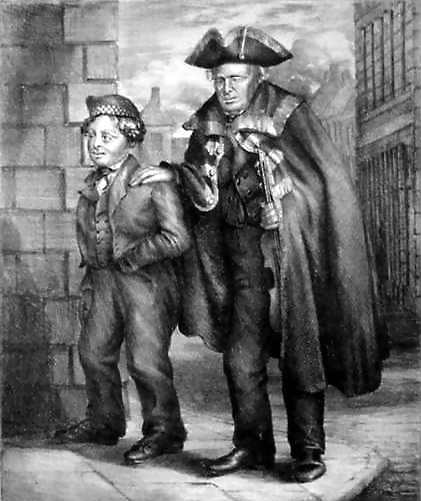
Painting of James Wallace, The last of the Town Waites of Berwick, by James Wilson. Wallace is pictured being led around the corner into Hide Hill, from the High Street. Wallace suffered blindness from an early age. © Berwick Museum and Art Gallery.
The Accounts for 1746-47 record payments to “John Oswald, McGill and Hogg, Waites”, while those for 1748-49 include payments to both “John Oswald and partners” and “John Hogg & Partners”. According to Brenchley, Oswald was recruited in 1735, together with his son and servant. Green states that John Oswald from Crail was employed to lead the waits from 1735 to 1758 and that his son, James Oswald, became one of the leading composers of the day, eventually ending up at the court of George lll. Southey lists David McGill as a Wait and Dancing Master in Berwick, whilst Brenchley states that David McGill’s son was a dancing master later in the century.
Henry Tate
The Accounts of 1752 list “The four waites” amongst those receiving salaries; unfortunately, their names are not given. It seems likely that three of them were John Oswald, David McGill and John Hogg. Southey lists Henry Tate as innkeeper and wait in Berwick and gives his date of death as 1784. It is possible that he was the fourth wait in 1752, although I have not found any further evidence to support this.
George Gilchrist
On 19th August 1758 the Accounts record: “To John Hogg late Waite deceast his Salarie due at Michs 17s6d”. The Guild Minute Book (p.363) records the appointment of George Gilchrist as Hogg’s successor.
James Wallace
In 1791 James Wallace appears in the Accounts as the “Piper of Castlegate”. The Berwick Advertiser recorded Wallace’s death on March 22nd 1845 (see above). An article in the same edition of the newspaper states: “Sometime before the passing of the municipal reform act the corporation dispensed with the services of the waits but continued their salaries to the period of their deaths. The last, James Wallace, who was blind from an early period of his life, was appointed one of them fifty years ago (though for twenty years previous to that he practised as a musician in Castlegate and the Greenses), and has continued to receive from the corporation his original salary.”
For more about James Wallace, see The Waits Website.
Caleb Buglass
The Corporation continued to employ four waits until the early part of the nineteenth century. Brenchley states that Caleb Buglass became a wait in 1798. The Accounts show that, by 1803, Buglass had succeeded Wallace in the role of Piper of Castlegate.
Robert Miller
The Accounts show that the number of waits dropped from four to three between 1807/08 and 1808/9. On February 23rd 1808 the burial is recorded, at Holy Trinity Church, of Robert Miller, Town Waite, aged 57. Miller was not replaced and only three waits were paid salaries until 1809. In 1810 the waits were superannuated. In 1818 their number had dropped to two.
Duties of the Waits
Fuller’s description, quoted above, provides us with a good indication of the duties of Berwick’s town waits in the eighteenth century. The article in the Berwick Advertiser on 22nd March 1845 provides a similar description:
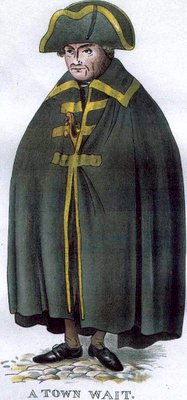
From Berwick-upon-Tweed: the history of the town and guild, by John Scott. London, 1888. Illustrated by photo-engravings, prepared by James Herriott, photographer, Berwick.
“Fifty years ago they consisted of four musicians whose business was to walk before the Mayor, Recorder and Justices, playing on their violins to and from church on Christmas Day, the day of the election of a Mayor, and on 5th November. They received a salary of seven pounds each, and were provided with a (-) cloak and cocked hat laced with gold. For their midnight serenading they were remunerated by the public at the Christmas Season.”
When George Gilchrist was appointed as one of the Corporation’s waits in 1758, to replace John Hogg who died that year, the Guild took the opportunity to confirm the duties of the four waits.
“It being moved in Guild that John Hogg late one of the Corporation’s Waites is now dead and that George Gilchrist Musician is a fit person to succeed him, he being very well qualified. It is therefore considered by the Guild and hereby ordered that the said George Gilchrist be accordingly appointed one of the Corporation’s Waites with the same salary and requisites that the other Waites have to commence from Michaelmas next. And it is further ordered that the Waites from henceforth begin to play round the Town from the second Monday in October, and continue to Candlemas Yearly.”
(Guild Minute Book 1752-60, p.363)
In addition to playing around the town, the Accounts show that the waits carried out other duties for which they received ad hoc payments. Between 1746 and 1788 they received 5s, between them, per occasion for playing before Mr Mayor and the Justices at Tweedmouth Court and Tuesday Court, playing before the magistrates on Michaelmas Day, and playing on Fair Day and High Market Days. The following payments are also recorded:
November 10th 1756: for playing at dinner that day
March 28th 1763: the proclamation of peace
June 4th 1763: His Majesty’s Birthday
July 16th 1763: the entry appears to read:
“To the Waites instead of playing up Lord Geo: Lenox on his being presented with the ffreedom”
1786: Christmas Day, Sessions Dinner
July 19th 1793: for the Bishop coming to Town
It appears that the waits continued to play at Tweedmouth Court, the sessions, Fair Day and High Market Days after 1788. However, payments to the waits began to be recorded under “sundries” rather than for specified events.
Waits’ Income
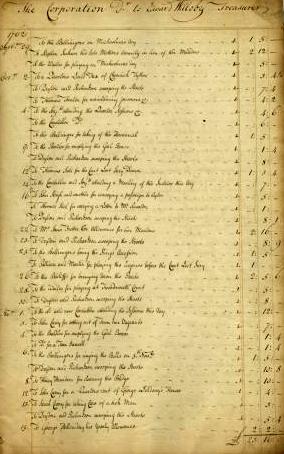
An extract from the Corporation Accounts 1762, showing the payments made to the Waites. © Berwick Record Office, H2-42-001. Click here to view.
Between 1746 and 1809 the Corporation paid an annual income to the town’s waits; the income was paid in instalments on, or soon after, the quarter days: Michaelmas (29th September), Christmas Day, Lady Day (25th March) and Midsummer Day (24th June). In addition to their annual salary, the waits received ad hoc payments for playing on special occasions. In the latter part of the century payments are recorded for “sundries” and “expenses”. In common with other servants of the town, the waits were provided with cloaks and hats, paid for by the Corporation. The following entry appears in the accounts for September 19th 1758:
“To John Hogg late Waite his widow for his cloak and hat £2-00-00”
The salaries paid to the waits, and other payments they received did not remain static.
- 1746: the three waits received a salary of £10-10-00 shared between them.
- 1752: four waits received a salary of £14-00-00.
- 1756: the salary was still £14-00-00 and the waits received four additional shared payments of 5s. In that year they also received a payment of £5-17-00 for “the difference of setting their Stints to Unfreemen”. A similar payment was made in the following year: £4-16-00 for “not setting their Stints to Stallangers”. These appear to have been isolated payments.
- 1761: the four waits received a shared salary of £24-16-00. Three additional payments of 5s are recorded in the Accounts.
- 1786: the salary had not increased, however the four waits received a total of £2-11-00 for “sundries” as well as 5s on Christmas Day, 8s for the Session Dinner, and 8s for the session.
- 1795-6: £26-08-00 was paid to the waits in salaries with an additional £3-05-00 ‘in lieu of fees’.
- 1803-04: salary of £28-00-00 to the four waits, with no additional ‘contingency’ payments, although a payment to Mr Paxton of £6-03-00 for “Waites Hats” is recorded.
- 1810: waits became superannuated and received a payment of £7-00-00 until their death.
The Demise of Berwick’s Town Waits
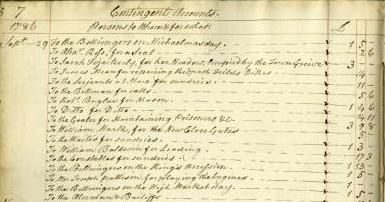
An extract from the Corporation Accounts 1786, showing the payments made to the Waites. © Berwick Record Office, H2-60-002. Click here to view.
When Robert Miller, Town Waite died of asthma at the age of 57, in February 1808, it signalled the beginning of the end for the town waits of Berwick upon Tweed. Miller was not replaced and the three remaining waits continued in the role for only a further two years. The Accounts for 1810-11 show a payment of £21-00-00 to “The three Waits superannuated”. It appears that the post of ‘Piper of Castlegate’ was discontinued at the same time. It is interesting to note, however, an entry in the Accounts for 1820-21: “To Hubbard for 2 Waits hats with gold lace”.
Afterword
In addition to employing waits, Berwick Corporation also paid a salary to a bell ringer during the eighteenth century, and paid for bell ringing on an ad hoc basis, shown in the accounts under “contingencies”. These payments usually identified the occasion, and indicate what celebrations and events were taking place and when. It is possible that the town’s waits would have been involved in some way at these times.
The accounts for 1757-58 record payments to Joseph Dodds and others for ringing the bells on each of the following occasions (date of payment shown in brackets):
Michaelmas Day (29.9.57)
King’s Coronation Day (22.10.57)
November 5th (5.11.57)
That day (10.11.57)
Xmas Day (26.12.57)
Ringing the bells to be heard by y fishermen (7.1.58) NB paid 12s6d
Good news from Hano- (11.3.58)
Fair Day (27.6.58)
This day (29.5.58)
Prince of Wales Birthday (5.6.58)
News of the Duke of Marlborough burning the Shiprde
His Majesty’s Accession Day (22.6.58)
Victory obtained by Prince Ferdinand over the French (1.7.58)
Bishop of Durham coming to town (5.8.58)
News of Genl Blighs taking Cherbuorgh (16.8.58)
News of taking Louisburgh (23.8.58)
News of the King of Prussia defeating the Russians (6.9.58)
King’s Own Scottish Borderers regimental band sheet music
The KOSB regimental band sheet music belonging to the Berwick Concert Band was transferred to the Berwick Record Office in late 2012. It includes Marches, Suites, and Waltzes. As part of the project volunteers have been cataloguing and re-boxing the (QM) quick marches section. This being part of an ongoing project.
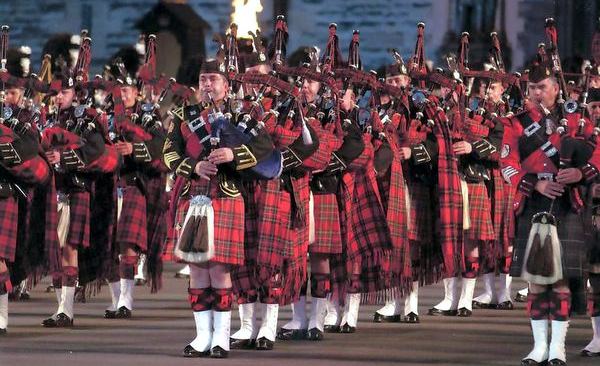
The Pipes and Drums of the King’s Own Scottish Borderers. © Kings Own Scottish Borderers, Regimental Museum, Berwick-upon-Tweed.
Sound Recordings
As part of the Waite and Sea project, recordings were made of local people giving their recollections of various types of music in the local area. These recordings can be heard at the Berwick Record Office. To view the list of recordings click here.
Acknowledgement:
Berwick’s Town Waits in the Eighteenth Century: Research from the Sound, Waite and Sea Project, by Colin Fleetwood.

